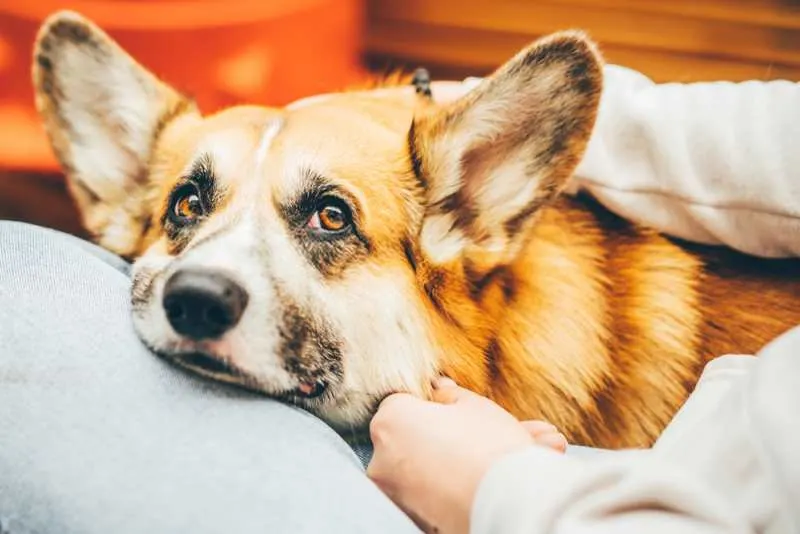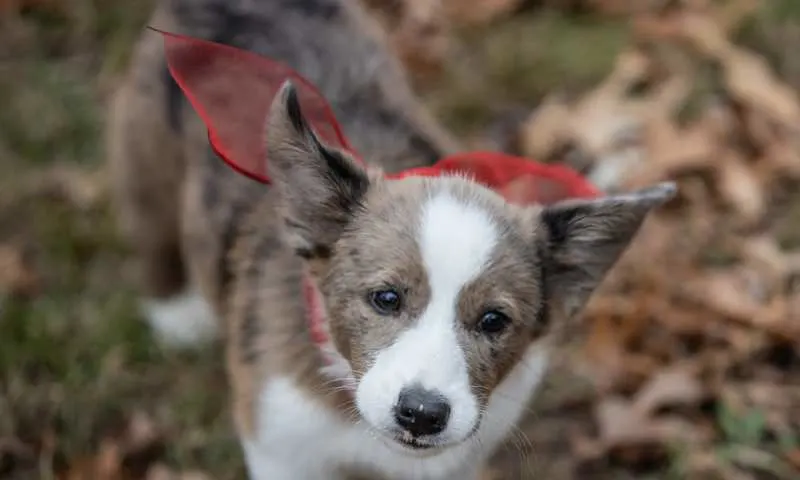Corgis are known to be playful and cheerful dogs, and we love them! But what if your beloved Corgi starts to cry? Did it get hurt? Maybe your Corgi is trying to tell you something? Chances are you’ve heard your Corgi “complaining” before, and you had to wonder:
Why do Corgis whine?
There may be several reasons behind this behavior – some are good, some are bad. So, should you be concerned about your Corgis whining? Do Corgis whine a lot?
You don’t have to worry about it. I’m here to cover all of the possible reasons as to why Corgis whine. Also, I’ll share some tips and tricks on how to keep this behavior under control.
Without further ado, let’s dive in!

Whining As A Form Of Communication
You might not realize it, but Corgis and other dogs use several methods of communication to interact with us. And whining is one form of communication – just like barking and growling.
Be careful about how you react to your Corgi’s whining and try to understand the reason behind it, though.
On the one hand, learning why your pet whines will help you understand it better and increase your bond. But on the other hand, if you encourage whining, you may end up with a problematic dog.
There are several things you can do to calm the whining – and maybe even stop it. But more on that later.
Let’s take a look at some possible reasons why your Corgi whines and what it’s trying to tell you by doing it.

Asking For Something
The most obvious reason your Corgi may be whining is that it wants something. Whether it’s food, water, or a walk, your Corgi is trying to tell you it needs something.
The whining should stop when you identify the problem and fix it.
However, if your Corgi is whining for more food after you just fed it, that’s a behavior problem that needs to be corrected. Make sure no one in your family is feeding your dog extra food, especially from the table.
If you feed your Corgi more food as a response to the “complaining,” it could only make the behavior worse.
Another example would be your Corgi whining for more time outdoors after you just took him for a walk. In this case, you might be dealing with potential digestive problems or bladder problems.
So, if your dog needs to go out again as soon as you come back inside, make sure you take it to the vet.
Attention-Seeking
Sometimes your Corgi will whine just because you aren’t paying attention to it. It can occur if you are doing something that doesn’t involve your Corgi, like focusing on an important task or having a phone conversation.
Also, it can happen when your Corgi becomes jealous of the time you’re spending with another pet or person.
This behavior is similar to how little kids whine when they’re bored with the grownups not paying attention to them.
Be sure you are giving your Corgi mental stimulation and exercise every day:
Boredom doesn’t only lead to whining. It could lead to destructive behaviors, as well – such as chewing on your furniture.

Stress Or Fear
It’s typical for a dog to whine when it’s afraid or anxious. This type of whining is often followed by yawning, lip licking, or averting the eyes. It’s not a rare sight to see your Corgi whining and yawning simultaneously.
By making these gestures, your Corgi is trying to calm itself down and signal to others that it’s not a threat. Whining due to fear can also be accompanied by flattening the ears, tucked tail, and crouching.
Expressing Pain
Whining may be a sign that your Corgi is in some kind of physical distress. And by complaining loudly, your Corgi is trying to let you know something isn’t quite right.
Here’s an example:
If your Corgi whines every time it tries to jump on the couch or go up the stairs, it might have joint pain due to arthritis.
In other cases, whining could be an effort on the pained dog’s part to calm itself down.
If there aren’t any obvious reasons why your Corgi is whining, you should take it to the vet to get checked out. You should rule out medical issues before you label the whining as a behavior problem.
Excitement
We’ve all seen a dog that’s so happy and excited to see someone that their body wiggles, their tail wags, and they jump around in joy. But sometimes, they might start whining, too.
If your Corgi is excited, whining could be its way of expressing this excitement – especially if followed by jumping and running around.
Then again, this type of whining might also be connected to attention-seeking.

Apology
Whining can also be seen as submissive behavior. When you scold your Corgi for chewing your shoes or digging up the flower beds, your pup might whine as a way of saying “Sorry.”
This kind of behavior comes from the dog’s ancestors, wolves:
Wolves can be outcasted from the pack if they break the pack rules. And to be accepted back in, a wolf would bow its head and put its tail between its legs to express remorse.
The same posture is displayed by your Corgi when it feels guilty.
If your Corgi’s whining is intended as an apology, acknowledge it before walking away. That will let your dog know that he has been accepted back.
Appeasement
Appeasement is linked to stress, and it’s something the non-confident dog will do. These dogs believe that the new dog or a person they’re meeting may pose a threat to them.
As a result, they will show appeasement behaviors – such as holding ears back, crouching, tucking the tail, and avoiding eye contact.
If your Corgi displays such behavior, you should consider seeking help from a professional trainer to help improve your pet’s confidence.
Trained Behavior
Dogs can show two types of “trained” whining behaviors – one being good and the other being bad.
An example of good behavior is when your dog whines at the door when it needs to go potty. A bad example of this behavior would be when the dog trained its owner to give it some attention whenever it whines.
You should be careful what you teach your Corgi – or what you let it teach you!

How To Stop Excessive Whining In Corgis?
If your Corgi is whining excessively, you should first find the reason behind it before addressing the actual behavior. The good news is that Corgis are intelligent dogs, and you can train them to whine less – or not whine at all.
Pay close attention to the sound of your Corgi’s whining and any behaviors followed by it. Over time, you will be able to recognize different pitches and volumes of whines for different reasons.
You will become familiar with the “I’m bored” and “I want something” whines pretty quickly. So, when you hear a different “cry,” it could help you determine if it’s caused by pain or stress, for example.
Approach your Corgi carefully and handle it gently if the whining is due to stress or pain, though. The situation can quickly escalate and, in extreme cases, even develop into aggression.
If your Corgi seems fearful or stressed out, try to find the cause of the problem. Dogs can be affected by various fears and phobias, just like humans.
Give your Corgi what it wants – but only under certain circumstances. If your Corgi is whining because it needs to go out for a potty break, you should let it out.
But make it a point not to give your pup what it wants immediately, as it will result in whining about everything.
That’s usually the number one cause of the problematic whining.
Respond selectively to your Corgis whining; if there’s no real need, you can ignore it. After you notice a moment of silence, you can offer it praise or a treat. That is also a perfect opportunity to work on “Quiet” commands.
Last but not least, enrich your Corgi’s environment. Make sure your Corgi has plenty of toys to play with and gets plenty of exercise. Corgis with pent-up emotions and energy are more likely to whine.

Why Do Corgis Whine? – Bottom Line
In conclusion, the question: “Why do corgis whine?” can have several answers.
The reason for Corgi’s whining ranges from excitement and attention-seeking to expressing pain, fear – and even stress. In most cases, excessive whining can be managed with basic training, exercise, and mental stimulation. But if this behavior is resistant to change, you might need to hire a professional trainer for help.
Consistency is the key when it comes to training your furry pet. Keep it up, and you will get desired results behavior-wise. Although you might not be able to stop your Corgi from whining completely, you can still manage to decrease it to tolerable levels.
Don’t forget to talk to your local vet if you suspect that whining is caused by pain. They will be able to tell you the exact cause and, if needed, proper treatment.

